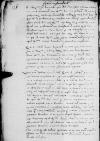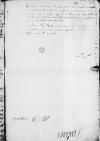Cum Deo duce sospes ⌊Vilnam⌋ attigeris, imprimis conveniens cum reverendissimo domino ⌊episcopo Plocensi⌋, illi me modis paper damaged⌈[dis]dis paper damaged⌉, quibus poteris, melioribus commendabis redditisque meis ⌊⌋ dices ea, quae tibi de coadiutoria et successore meo commisi, quemadmodum etiam scripsi dominationi eius reverendissimae, rogabisque, ut pro consensu impetrando ad eam coadiutoriam cum successione etc. iuxta copias litterarum, quas paper damaged⌈[s]s paper damaged⌉ illi offeres, apud ⌊serenissimam maiestatem regiam⌋ pro me intercedat. Et si vult, quod tu ipse ⌊⌋ meas ⌊serenissimae maiestati regiae⌋ des atque ⌊maiestati reginali⌋ in omnibus ea, quae ⌊dominatio eius reverendissima⌋ iubet, facias, maxime autem quicquid tibi apud reginalem maiestatem dicendum et faciendum consuluerit.
Quod si ⌊serenissima maiestas regia⌋ huiusmodi, ut sunt copiae, litteras binas manu sua et serenissimi ⌊iunioris regis⌋ subscriptas dare dignabitur, tunc primum ⌊reverendissimi domini Varmiensis⌋ et meas litteras pro venerabili domino ⌊Ioanne Czymerman⌋ cantore Varmiensi serenissimae maiestati regiae praesentabis et consensum resignationis plebaniae in ⌊Goląbya⌋ in personam ipsius domini Ioannis Czimerman cum praesentatione rogabis.
Petes etiam habitis copiarum litteris ⌊reverendissimum dominum Plocensem⌋, ut pro maiori paper damaged⌈[i]i paper damaged⌉ coadiutoriae complemento, quae cum ⌊capituli Varmiensis⌋ sanioris partis consensu confirmari debet, quod a ⌊maiestate regia⌋ venerabili domino ⌊Paulo Plutowski⌋ praeposito Varmiensi scriberetur, ut ipse hoc negotium coadiutoriae ex officio suo et nomine ⌊serenissimae maiestatis regiae⌋ in favorem meum proponeret suumque mihi suffragium viva voce in ⌊capitulo⌋ daret, et ut in eisdem litteris regiis ei spes gratiae maiestatis regiae promitteretur. Quemadmodum hoc ipsum ⌊reverendissimus dominus Plocensis⌋ pro suo in me favore in forma meliori conscribi sciet et committet. Maxime autem curabis, quod de ea post me successione quam paucissimi sciant. Celabisque tam coadiutoriam, quam etiam successionem, ne quicquam earum praesentiat doctorem ⌊Ioannem Benedicti⌋. Et si forsan aliquid offecerit, intendes, quantum potes diligentius apud ⌊reverendissimum dominum Plocensem⌋ et ubi hoc necessarium esse putaveris, ne pro tempore electionis meae in coadiutorem ipse doctor ⌊Ioannes Benedicti⌋ a curia regia dimittatur.
Alia, quaecumque esse videris opportuna et in rem meam expedientia, praesertim ut omnia ex consilio ⌊reverendissimi domini Plocensis⌋ dirigas, tuae committo industriae.
 BCz, 244, p. 125
Reddes etiam litteras ⌊Ioannis Coclaei⌋ ⌊reverendissimo domino Plocensi⌋ et rogabis, si quid pro eodem apud ⌊serenissimam maiestatem regiam⌋ expedire poterit. Et ut contiones ⌊Georgii Vicelii⌋, quae mihi et doctae piaeque hisque temporibus contra Luteranam haeresim commodissimae esse videntur, imprimi possent, quod mihi rem faciet apprime gratam. I felix et Dominus Deus sit dux tuus, eoque duce redi feliciter, et quantum potes, iter tuum matura.
BCz, 244, p. 125
Reddes etiam litteras ⌊Ioannis Coclaei⌋ ⌊reverendissimo domino Plocensi⌋ et rogabis, si quid pro eodem apud ⌊serenissimam maiestatem regiam⌋ expedire poterit. Et ut contiones ⌊Georgii Vicelii⌋, quae mihi et doctae piaeque hisque temporibus contra Luteranam haeresim commodissimae esse videntur, imprimi possent, quod mihi rem faciet apprime gratam. I felix et Dominus Deus sit dux tuus, eoque duce redi feliciter, et quantum potes, iter tuum matura.
 BCz, 244, p. 125
Reddes etiam litteras
BCz, 244, p. 125
Reddes etiam litteras 
